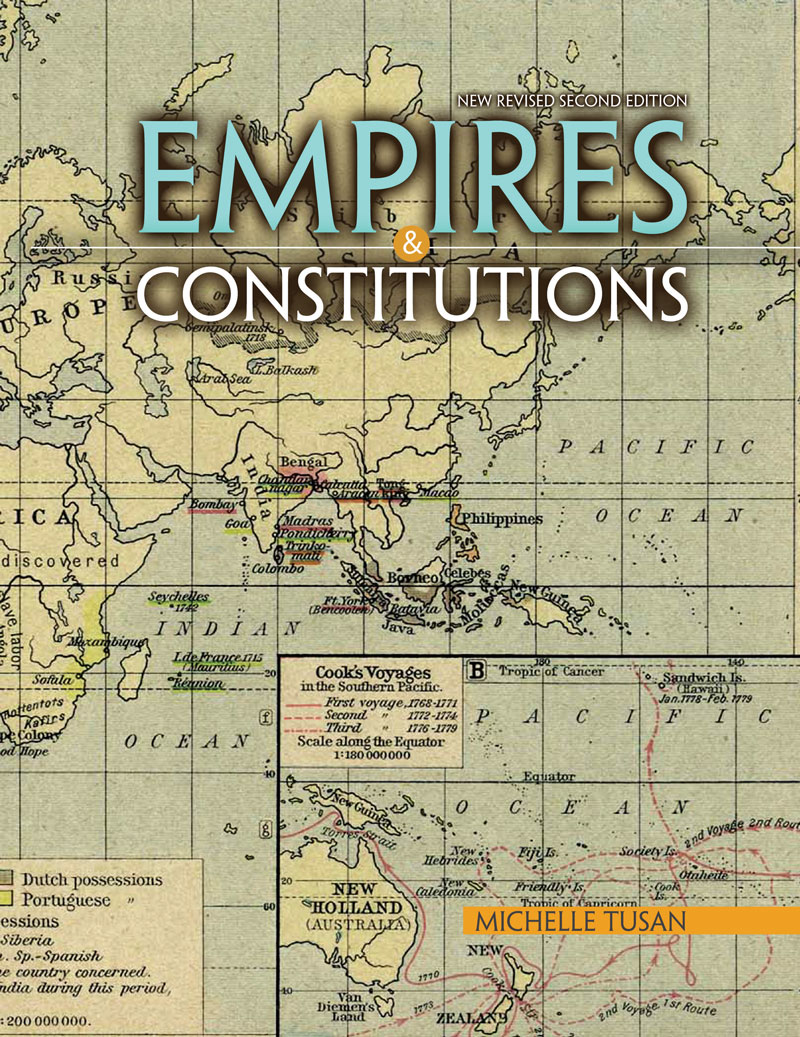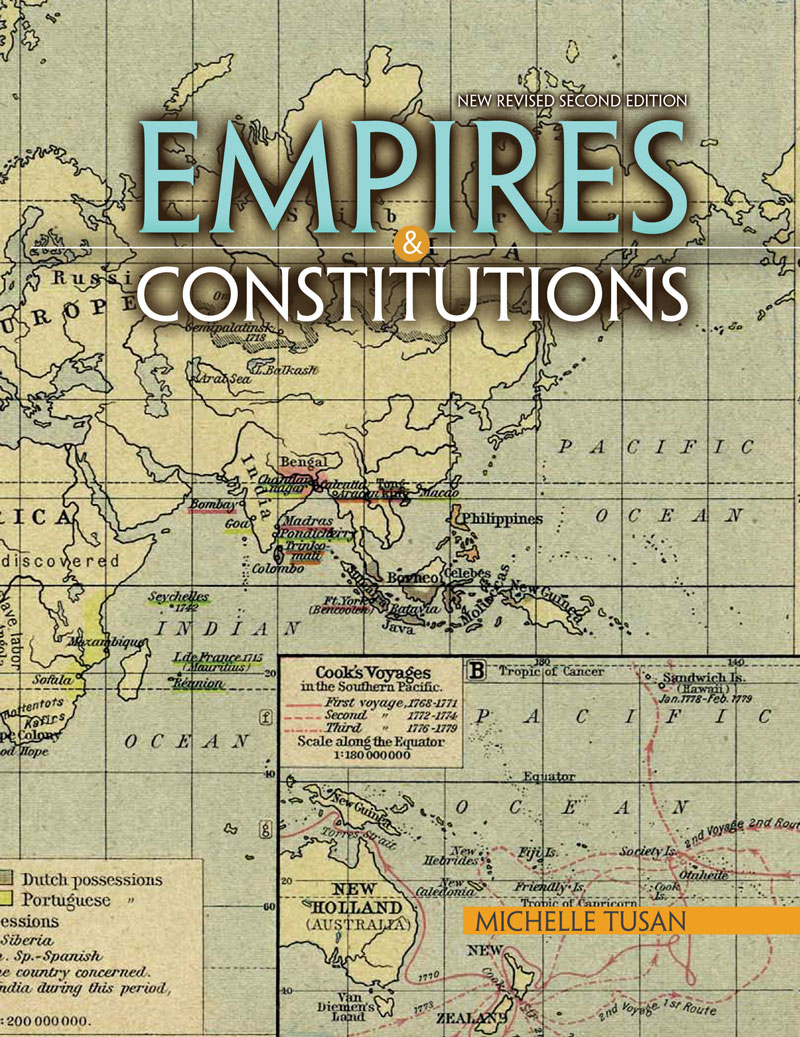Empires & Constitutions
Author(s): Michelle Tusan
Edition: 2
Copyright: 2015
Pages: 340
Edition: 2
Copyright: 2015
Pages: 340
Empires and Constitutions explores the history of the US Constitution in its global context. Organized into three units which are each broken down into short chapters by topic, the book focuses on the western tradition and traces the rise and fall of the imperial model of government starting with the Roman Empire. The case of the U.S., First as a colony of Great Britain and later as an independent nation state which expands across North America, is studied in terms of how new constitutional models challenged old imperial forms of governance.
Each unit begins with a short introduction which situates the primary source readings that follow in the historical moment. The documents begin with short descriptions about the author in his/her time period and briefly summarize the excerpt. A guide on how to read primary sources is included at the end of the introduction. Discussion questions are included at the end of each chapter.
Part One: Empires and Constitutions
CHAPTER 1: Rome: The Original Empire
Sallust, Roman Decline
Jerome, The Fate of Rome
Justinian, Corpus Iuris Civilis
CHAPTER 2: The Case of Eurasia
A Visit to the Wife of Suleiman the Magnificent
Peter the Great Reform Legislation
Catherine the Great Instructs the Legislative Commission
Count von Beust, Memoirs of the Ausgleich
CHAPTER 3: The Americas and Slavery
Bartolomé de las Casas, A Short Account of the Destruction of the Indies
Juan Ginés de Sepúlveda, Concerning the Just Cause of the War Against the Indians
Captain Thomas Phillips, The Voyage of the Ship Hannibal of London
Alexander Falconbridge, An Account of the Slave Trade
John Newton, Thoughts Upon the African Slave Trade
CHAPTER 4: The Case of British North America
Stamp Act Congress, Declaration of Rights
Thomas Jefferson, A Summary View of the Rights of British America
Thomas Paine, Common Sense
CHAPTER 5: The Enlightenment and Democracy
English Bill of Rights
John Locke, Second Treatise, Popular Basis of Political Authority
John Locke, Second Treatise, Property
Baron de Montesquieu, The Spirit of the Laws
Declaration of the Rights of Man and Citizen
Declaration of the Rights of Woman and Citizen
CHAPTER 6: Declaring Independence
Declaration of Independence
Thomas Jefferson, Bill to Prevent the Importation of Slaves
Articles of Confederation
CHAPTER 7: The US Constitution
United States Constitution
James Madison, Republican Government: Federalist No. 10
Poughkeepsie: Just Arrived by Express
James Madison, Observations on Jefferson’s Draft of the Constitution of Virginia
CHAPTER 8: Western Expansion and the Nevada Constitution
Northwest Ordinance
Monroe Doctrine
Nevada Constitution
Part Two: The New Age of Empire
CHAPTER 9: Economic and Political Explanations
John Hobson, Imperialism
V.I. Lenin, Imperialism: The Highest Stage of Capitalism
CHAPTER 10: Imperialism as “Civilizing Mission”
Rudyard Kipling, The White Man’s Burden
E. D. Morel, The Black Man’s Burden
John Stuart Mill, Representative Government
W.E.B. DuBois, The Color Line Belts the World
CHAPTER 11: The Scramble for Empire
Sir Arthur Conan Doyle, The Crime of the Congo
Treaty of Berlin, 1885
King Leopold II, The Sacred Mission of Civilization
CHAPTER 12: The Scramble for Africa
London Times Articles on the Congo
George Washington Williams, An Open Letter to His Serene Majesty Leopold II
Joseph Conrad, Letters
W.T. Stead, Our Death Camps in South Africa
CHAPTER 13: World War I
Woodrow Wilson, Fourteen Points
Michelle Tusan, ‘Crimes against Humanity’ and World War
Viscount James Bryce, Treatment of the Armenians in the Ottoman Empire
Part Three: Decolonization and Democracy
CHAPTER 14: World War and Nationalism
Irish Declaration of Independence
Mohandas Gandhi, Quit India Speech
Michelle Tusan, Passive Resistance in Action: Women Join the Independence Movement
Atlantic Charter
Ho Chi Minh, Declaration of Independence of the Democratic Republic of Vietnam
Jawaharlal Nehru, Speech on the Granting of Indian Independence
CHAPTER 15: Terrorism and Empire in Algeria
Declaration of the Front de Liberation Nationale (FLN)
Charles de Gaulle, Speech at Constantine
CHAPTER 16: Decolonization: The Middle East and Asia
Balfour Declaration
Lieutenant General Sir Stanley Maude, The Proclamation of Baghdad
Taha Hussien, The Future of Culture in Egypt
United Nations Declaration on Granting Independence to Colonial Countries and Peoples
CHAPTER 17: Decolonization: The Soviet Union
Winston Churchill, Iron Curtain Speech
Vaclav Havel, President of Czechoslovakia New Years Address to the Nation, 1990
CHAPTER 18: Decolonization: Africa
Harold Macmillan, Wind of Change
Enoch Powell, Transcript of “Rivers of Blood” Speech
All African People’s Conference, Resolution on Imperialism and Colonialism, Accra
Julius Nyerere, Good Governance for Africa
Desmond Tutu, Look to the Rock from which you were Hewn
CHAPTER 19: New Nations, Old Problems
Joseph Stiglitz, Globalization and Its Discontents
Howard W. French, Into Africa: China’s Wild Rush
Michelle Tusan is Professor of History at the University of Nevada, Las Vegas. Her books include: The Last Treaty: Lausanne and the End of the First World War in the Middle East; The British Empire and the Armenian Genocide: Humanitarianism and Imperial Politics from Gladstone to Churchill; Smyrna’s Ashes: Humanitarianism, Genocide and the Birth of the Middle East and Women Making News: Gender and Journalism in Modern Britain. She has published prize-winning articles in the American Historical Review, The Journal of Modern History and Past and Present and co-authored a textbook, Britain Since 1688: A Nation in the World. Her work has been supported by the National Endowment for the Humanities, the Mellon Foundation and Fulbright. She is President of the North American Conference on British Studies.
Empires and Constitutions explores the history of the US Constitution in its global context. Organized into three units which are each broken down into short chapters by topic, the book focuses on the western tradition and traces the rise and fall of the imperial model of government starting with the Roman Empire. The case of the U.S., First as a colony of Great Britain and later as an independent nation state which expands across North America, is studied in terms of how new constitutional models challenged old imperial forms of governance.
Each unit begins with a short introduction which situates the primary source readings that follow in the historical moment. The documents begin with short descriptions about the author in his/her time period and briefly summarize the excerpt. A guide on how to read primary sources is included at the end of the introduction. Discussion questions are included at the end of each chapter.
Part One: Empires and Constitutions
CHAPTER 1: Rome: The Original Empire
Sallust, Roman Decline
Jerome, The Fate of Rome
Justinian, Corpus Iuris Civilis
CHAPTER 2: The Case of Eurasia
A Visit to the Wife of Suleiman the Magnificent
Peter the Great Reform Legislation
Catherine the Great Instructs the Legislative Commission
Count von Beust, Memoirs of the Ausgleich
CHAPTER 3: The Americas and Slavery
Bartolomé de las Casas, A Short Account of the Destruction of the Indies
Juan Ginés de Sepúlveda, Concerning the Just Cause of the War Against the Indians
Captain Thomas Phillips, The Voyage of the Ship Hannibal of London
Alexander Falconbridge, An Account of the Slave Trade
John Newton, Thoughts Upon the African Slave Trade
CHAPTER 4: The Case of British North America
Stamp Act Congress, Declaration of Rights
Thomas Jefferson, A Summary View of the Rights of British America
Thomas Paine, Common Sense
CHAPTER 5: The Enlightenment and Democracy
English Bill of Rights
John Locke, Second Treatise, Popular Basis of Political Authority
John Locke, Second Treatise, Property
Baron de Montesquieu, The Spirit of the Laws
Declaration of the Rights of Man and Citizen
Declaration of the Rights of Woman and Citizen
CHAPTER 6: Declaring Independence
Declaration of Independence
Thomas Jefferson, Bill to Prevent the Importation of Slaves
Articles of Confederation
CHAPTER 7: The US Constitution
United States Constitution
James Madison, Republican Government: Federalist No. 10
Poughkeepsie: Just Arrived by Express
James Madison, Observations on Jefferson’s Draft of the Constitution of Virginia
CHAPTER 8: Western Expansion and the Nevada Constitution
Northwest Ordinance
Monroe Doctrine
Nevada Constitution
Part Two: The New Age of Empire
CHAPTER 9: Economic and Political Explanations
John Hobson, Imperialism
V.I. Lenin, Imperialism: The Highest Stage of Capitalism
CHAPTER 10: Imperialism as “Civilizing Mission”
Rudyard Kipling, The White Man’s Burden
E. D. Morel, The Black Man’s Burden
John Stuart Mill, Representative Government
W.E.B. DuBois, The Color Line Belts the World
CHAPTER 11: The Scramble for Empire
Sir Arthur Conan Doyle, The Crime of the Congo
Treaty of Berlin, 1885
King Leopold II, The Sacred Mission of Civilization
CHAPTER 12: The Scramble for Africa
London Times Articles on the Congo
George Washington Williams, An Open Letter to His Serene Majesty Leopold II
Joseph Conrad, Letters
W.T. Stead, Our Death Camps in South Africa
CHAPTER 13: World War I
Woodrow Wilson, Fourteen Points
Michelle Tusan, ‘Crimes against Humanity’ and World War
Viscount James Bryce, Treatment of the Armenians in the Ottoman Empire
Part Three: Decolonization and Democracy
CHAPTER 14: World War and Nationalism
Irish Declaration of Independence
Mohandas Gandhi, Quit India Speech
Michelle Tusan, Passive Resistance in Action: Women Join the Independence Movement
Atlantic Charter
Ho Chi Minh, Declaration of Independence of the Democratic Republic of Vietnam
Jawaharlal Nehru, Speech on the Granting of Indian Independence
CHAPTER 15: Terrorism and Empire in Algeria
Declaration of the Front de Liberation Nationale (FLN)
Charles de Gaulle, Speech at Constantine
CHAPTER 16: Decolonization: The Middle East and Asia
Balfour Declaration
Lieutenant General Sir Stanley Maude, The Proclamation of Baghdad
Taha Hussien, The Future of Culture in Egypt
United Nations Declaration on Granting Independence to Colonial Countries and Peoples
CHAPTER 17: Decolonization: The Soviet Union
Winston Churchill, Iron Curtain Speech
Vaclav Havel, President of Czechoslovakia New Years Address to the Nation, 1990
CHAPTER 18: Decolonization: Africa
Harold Macmillan, Wind of Change
Enoch Powell, Transcript of “Rivers of Blood” Speech
All African People’s Conference, Resolution on Imperialism and Colonialism, Accra
Julius Nyerere, Good Governance for Africa
Desmond Tutu, Look to the Rock from which you were Hewn
CHAPTER 19: New Nations, Old Problems
Joseph Stiglitz, Globalization and Its Discontents
Howard W. French, Into Africa: China’s Wild Rush
Michelle Tusan is Professor of History at the University of Nevada, Las Vegas. Her books include: The Last Treaty: Lausanne and the End of the First World War in the Middle East; The British Empire and the Armenian Genocide: Humanitarianism and Imperial Politics from Gladstone to Churchill; Smyrna’s Ashes: Humanitarianism, Genocide and the Birth of the Middle East and Women Making News: Gender and Journalism in Modern Britain. She has published prize-winning articles in the American Historical Review, The Journal of Modern History and Past and Present and co-authored a textbook, Britain Since 1688: A Nation in the World. Her work has been supported by the National Endowment for the Humanities, the Mellon Foundation and Fulbright. She is President of the North American Conference on British Studies.

